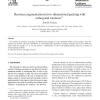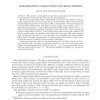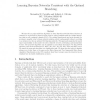130
click to vote
ISAAC
2010
Springer
15 years 7 hour ago
2010
Springer
We consider the problem of finding a sparse multiple of a polynomial. Given f F[x] of degree d, and a desired sparsity t, our goal is to determine if there exists a multiple h F[...
152
click to vote
ALGORITHMICA
2010
15 years 13 days ago
2010
The problem of computing the chromatic number of a P5-free graph (a graph which contains no path on 5 vertices as an induced subgraph) is known to be NP-hard. However, we show tha...
113
click to vote
JCT
2000
15 years 1 months ago
2000
We give a strongly polynomial-time algorithm minimizing a submodular function f given by a value-giving oracle. The algorithm does not use the ellipsoid method or any other linear ...
117
click to vote
ORL
2006
15 years 2 months ago
2006
We consider the problem of packing two-dimensional rectangles into the minimum number of unit squares, when 90 rotations are allowed. Our main contribution is a polynomial-time al...
108
click to vote
JCT
2006
15 years 2 months ago
2006
We construct a polynomial-time algorithm to approximate the branch-width of certain symmetric submodular functions, and give two applications. The first is to graph "clique-wi...
136
click to vote
FSTTCS
2008
Springer
15 years 3 months ago
2008
Springer
ABSTRACT. We study the problem of space-efficient polynomial-time algorithms for directed stconnectivity (STCON). Given a directed graph G, and a pair of vertices s, t, the STCON ...
110
click to vote
CRYPTO
2010
Springer
15 years 3 months ago
2010
Springer
At the heart of many recent lattice-based cryptographic schemes is a polynomial-time algorithm that, given a `high-quality' basis, generates a lattice point according to a Ga...
116
click to vote
SODA
1997
ACM
15 years 3 months ago
1997
ACM
We give a polynomial-time algorithm for the following problem: Given a degree sequence in which each degree is bounded from above by a constant, select, uniformly at random, an un...
116
click to vote
SODA
2001
ACM
15 years 3 months ago
2001
ACM
We explore the natural question of whether all NP-complete problems have a common restriction under which they are polynomially solvable. More precisely, we study what languages a...
114
click to vote
ICMLA
2007
15 years 3 months ago
2007
We introduce a polynomial-time algorithm to learn Bayesian networks whose structure is restricted to nodes with in-degree at most k and to edges consistent with the optimal branch...



